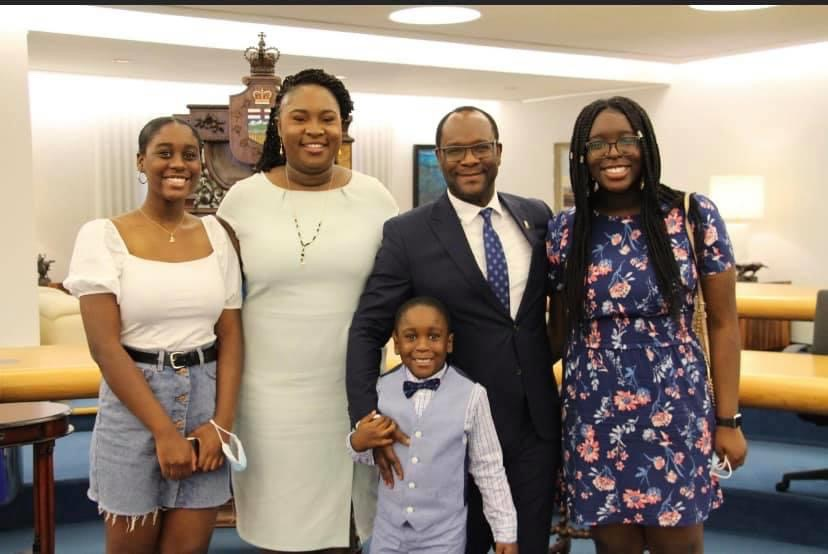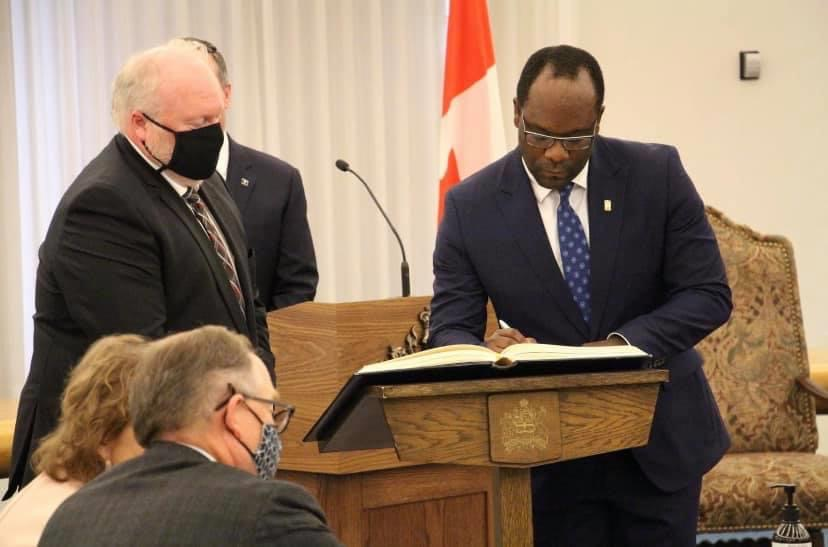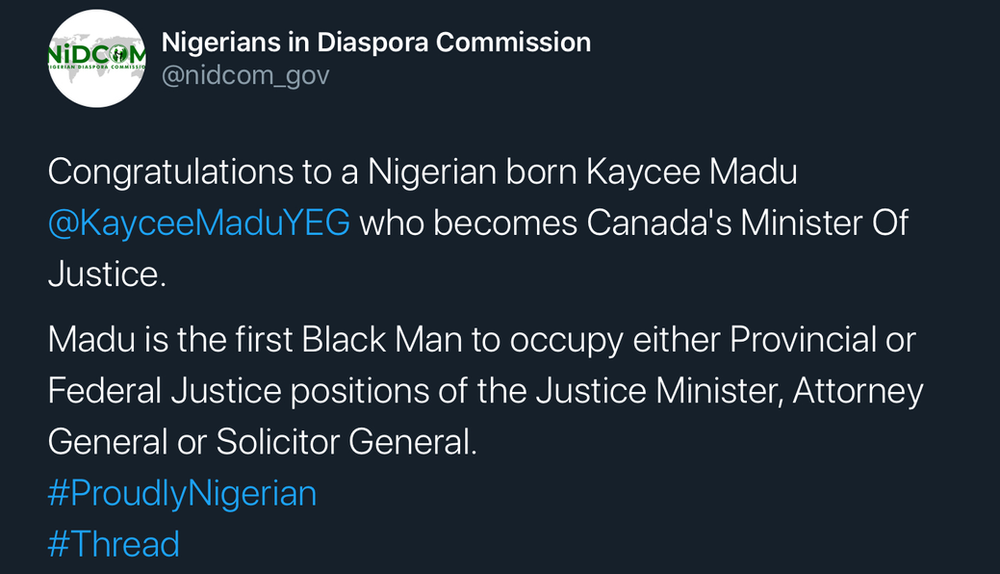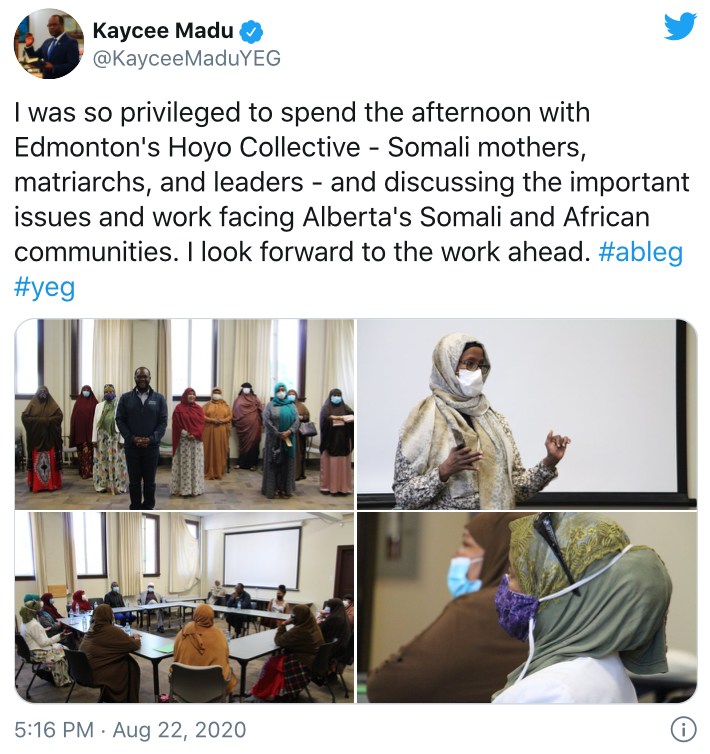In the face of institutional racism around the globe, Canada has made history appointing its first Black Justice Minister and Solicitor General. Kelechi Madu, a Nigerian-born lawyer, was named the new Justice Minister of Alberta, promoted from his position in Municipal Affairs. The Premier of Alberta, Jason Kenney considered the move important to bring the needed perspective and change in the justice system.

In a statement shared by Madu, he expressed his commitment to ensuring the justice system represents all Albertans in a way that is fair and accountable. “My fundamental belief that every soul deserves equal access to justice has always informed my legal work, and that will never change,” he wrote. Madu has spent his professional career working for the people through his work with Legal Aid Alberta, Labour, Immigration, and Human Rights Tribunals, and in the courts.
Madu was born and raised in the South-eastern part of Nigeria and graduated with a law degree from the University of Lagos in 2001, practicing law in both Nigeria and Alberta. He made the move to Canada, along with his wife for her postgraduate studies at the University of Alberta. Madu runs a small law firm with his wife in the city. His experience in government includes employment standards investigations, strategic and operational public policy, and governmental issues management to name a few. He gives back to the community by volunteering his legal skills with the Law Society of Alberta Lawyer Referral Program and the Edmonton Community Legal Centre. Madu is also a member of the Igbo Cultural Association of Edmonton and supports his community league activities and his church.

In his new role, Madu hopes to modernize the Police Act to ensure equality for marginalized people by the law, a promise Madu’s predecessor Doug Schweitzer made earlier this year. Approximately 15,000 Albertans gathered early in June following the murder of George Floyd, in support of Black Lives Matter. Since then, many Albertans also raised concerns about policing at home. Nearly two years ago, work began to review and update Alberta’s decades-old Police Act which was first introduced in 1988 and last updated in 2011. Madu acknowledged the work Schweitzer had done so far to address police funding, the scourge of rural crimes, and reform of the parole system. “I also look forward to working on many critical democratic reforms, including recall legislation and important citizenship initiative referendums,” stated Madu.
At a time when Albertans have grown more sensitive to racial prejudice, Kenney said the appointment of Mr. Madu makes a powerful statement. “[Madu] is a man who has experienced racial prejudice firsthand and can bring that sensitivity to this important role,” Kenney said. “I’m excited to have him in that position.” Indeed Madu reflected on the importance of carrying the responsibilities of his position stating, “carrying this ministry forward amid these difficult social and economic times weighs heavily on my mind.” The premier said Madu is the first Black Canadian to occupy either provincial or federal justice positions of the justice minister, attorney general or solicitor general. Madu was first elected as a minister in Alberta in the 2019 general election and was a member of the Legislative Assembly of the province, representing the district of Edmonton-South West.

Dunia Nur, president of the Edmonton-based African Canadian Civiic Engagement Council, stated that Madu had become a role model for the community. The council encourages and reinforces opportunities for members of the African, Caribbean and Black communities across Canada. Nur believes that it is not only his background as a lawyer that makes him suitable for the role, but his active participation as a member in the African community. “Historically, these are positions that have been occupied by white men that have no understanding of the disproportional impact of the justice system and what Black communities experience,” she said. According to Nur, Madu’s appointment as Justice Minister shows that the government is listening.

Members of the Hoyo Collective based in Edmonton also expressed excitement over Madu’s new role. The Hoyo Collective is a grassroots collective that gives education, social support and resources for women and children. The group assists newcomer families navigate barriers in Canada, including within the justice system. “For children born in and out of this country and not knowing the system in this country, they fall into cracks,” said president Asha Fahiye. The group met with Madu just before he took on his new role to discuss some of their concerns. According to Fahiye, Madu’s background allows him to understand where they are coming from.

However, some are wary of the changes the new appointment will actually bring. Mubarik Bayere is an organizer with Make it Awkward & Be The Change, which held a virtual rally against racism that attracted tens of thousands of views. For him, the appointment is empty symbolism. “I don’t think there’s going to be any fundamental difference simply because the person is Black,” he said. Bayere pointed to Barack Obama’s presidency as an example where systemic racism continued even with a Black man in the highest office.
Nur, however said there are a lot of high hopes placed on the new justice minister. “The black community celebrates him,” she said.
Powered by WPeMatico


